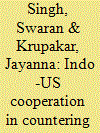| Srl | Item |
| 1 |
ID:
152651


|
|
|
|
|
| Summary/Abstract |
The article assesses China’s Indian Ocean strategy against the backdrop of its naval base development in Djibouti. It argues that China’s naval force posturing stems from a doctrinal shift to ocean-centric strategic thinking and is indicative of the larger gameplan of having a permanent naval presence in the Indian Ocean. China’s maritime strategy comprises four key components. First, to channel naval reinforcements for securing its maritime trade and economic interests in the Indian Ocean Region (IOR)—even as it strengthens the Maritime Silk Road initiative. Second, to develop logistical and operational capacities for a permanent far-seas presence, including preparedness for maritime combat and non-combat operations. Third, to undermine India’s geo-strategic influence in the IOR as the two lock into a near zero-sum game maritime competition. Fourth, to overcome the threat of US naval dominance and deter its coercive tactics by enhancing the costs of military conflict. Beijing’s ultimate objective is to emerge as a ‘global maritime power’ capable of commanding the far seas and oceans.
|
|
|
|
|
|
|
|
|
|
|
|
|
|
|
|
| 2 |
ID:
134052


|
|
|
|
|
| Publication |
2014.
|
| Summary/Abstract |
The increasing dependence on Information and Communication Technologies (ICTs) has unleashed a whole new genre of cyber terrorism. Cyber attacks on critical infrastructure, online hate propaganda and use of the internet for recruiting, planning and effecting terrorist attacks have become new frontiers of terrorism. The ubiquitous cyberspace has expanded terrorism structures and transformed their operations. Given their democratic traditions of privileging basic freedoms, such as individual privacy, and the unprecedented spread of the internet, India and the US face a formidable challenge in confronting cyber terrorism. While both countries share a strong political affinity to cooperate and have set up institutional mechanisms to secure cyberspace, divergences in their approaches and a lack of clarity and consensus on their immediate and long-term goals continue to be their fundamental limitations. In spite of their strong commitment to work together, their divergent approaches to internet governance and episodes like the WikiLeaks and Snowden affairs have only re-enforced their continuing trust deficit.
|
|
|
|
|
|
|
|
|
|
|
|
|
|
|
|